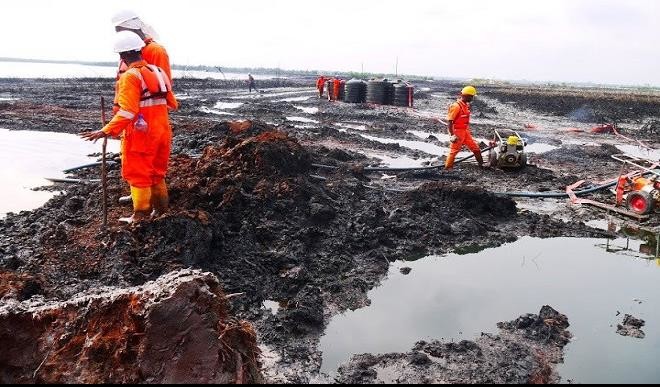The Hydrocarbon Pollution and Remediation Project (HYPREP) says rising insecurity in Ogoniland will not deter the Federal Government from remediating decades of oil-impacted communities in the area.

HYPREP’s Coordinator, Dr Marvin Dekil, gave the assurance on the sideline of HYPREP’s meeting with officials of the American Embassy on Tuesday, August 20, 2019 in Port Harcourt, Rivers State.
No fewer than 10 victims recently lost
their lives in Bodo, K-Dere, B-Dere, Gbe, Bomu and Kpor communities in renewed
gun violence in Ogoniland.
Dekil said that HYPREP, under the Federal Ministry of Environment, would not
halt the clean-up exercise due to the dire consequences such a delay could have
on the entire project.
“Insecurity will not deter us from carrying out Ogoni clean-up because insecurity is not peculiar to Ogoni communities alone, but to the entire Rivers.
“A quick visit to the sites will reveal that all the people working there are from Ogoni communities. So, I do not think that there could be better security than the community people.
“Presently, we have over 630 people engaged by our contractors working on our various sites, and all the workers are all indigenous (Ogoni) people,” he said.
Dekil said the President Muhammadu Buhari-led Federal Government was passionate to continuation of the clean-up exercise in spite of attempts by criminals to delay the process.
He said the remediation agency would soon award contracts to qualified firms to build water facilities before the end of 2019 as recommended by the United Nations Environment Project (UNEP) Report.
According to him, the water facilities would be provided only to communities whose underground source of water was contaminated by decades of oil spills in the area.
“We are almost getting to the stage where contracts would be awarded for the water projects in specific communities, such as Nsisioken, among others.
“The primary reason the United Nations was invited to Nigeria is to assess environment challenges in Ogoniland. The mandate is to remediate impacted sites in Ogoniland while water is secondary.
“So, the next phase of remediation work is the complex sites, which the ground water and soil were impacted by oil spill,” he said.
The remediation agency and UNEP, Dekil said, had characterised the complex sites as well as started the procurement process to bring competent companies to be participants in the clean-up exercise.
He added that works were in various stages of completion across the various oil-impacted sites in Eleme, Gokana, Khana and Tai Local Government Areas that cover Ogoniland.
“But, we have made more progress in Tai and Eleme – as most of the companies have built their bio cells in the areas that we used for the clean-up exercise.
“Aside this, we are also having serious engagements with Oil Watch Africa, comprising delegates from 15 African countries.
“We have also engaged as well as took Ogoni-elected representatives from the Senate to Councillors round the clean-up sites with a view to making the exercise a success,’’ he said.
Dekil and officials from the U.S. Embassy, however, declined to comment on the outcome of the meeting between both bodies.
By Desmond Ejibas
